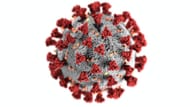In the ongoing battle against COVID-19, new research led by scientists at the Yale School of Public Health has shed light on the intricate dynamics of transmission, immunity and effectiveness of preventive measures.
Published in Nature Communications, this study not only reaffirms the significance of masks and air filtration but also underscores the collaborative role they play alongside vaccines in reducing the risk of infection.
As COVID-19 cases show signs of resurgence in various communities, it's essential to delve into the insights provided by this research and understand how these findings could shape our approach to managing the pandemic.
Is Covid back on the rise?
While the protective benefits of COVID vaccines against severe illness have been widely acknowledged, gauging their efficacy in preventing transmission has posed challenges.
The aforementioned research introduces a novel approach by assessing the concept of vaccine "leakiness," where vaccines offer protection against transmission up to a certain threshold of virus exposure.
To illustrate this concept, the study examines infections in Connecticut prisons, providing a unique environment for analysis due to the comprehensive data available on exposure levels and previous infection or vaccination history.
Hybrid immunity takes the lead

The study's findings highlight the remarkable role of hybrid immunity – a combination of vaccination and previous infection – in providing robust protection against COVID-19 even in close quarters with infected individuals.
This form of immunity demonstrated superior efficacy compared to immunity acquired solely from vaccination or prior infections. While the latter options offered reasonable protection under low virus exposure, their effectiveness dwindled when faced with higher exposure levels.
Understanding the nuances
The research is observational in nature, drawing conclusions from historical data rather than experimental testing. This limitation underscores the need for further research to corroborate the findings, though.
Additionally, the study solely focused on infection rates without considering the severity of cases. To enhance the study's applicability, it would be valuable to replicate these observations in settings with older populations, like retirement homes, to determine whether the trends remain consistent.
Masks, ventilation and immunity enhancement
The research contributes nuance to the ongoing discourse surrounding preventive measures. Beyond reaffirming the importance of avoiding prolonged exposure to the virus, the study underscores the positive impact of masks and ventilation.
These measures not only serve as independent safeguards but also amplify the effectiveness of immunity conferred by vaccination and prior infections. This nuanced perspective underscores the need for a multifaceted approach to protection.
Implications for public health

As COVID-19 cases resurge, the research findings prompt several actionable steps for the public.
Firstly, the importance of booster shots gains renewed prominence. With only a fraction of adults in the US having received the latest booster, there's room for improvement in bolstering immunity.
The research reinforces the life-saving potential of vaccines and suggests that staying up-to-date with boosters can further safeguard against infections.
Minimizing long-term health risks of COVID-19
The lingering uncertainty about the long-term health implications of repeated COVID-19 infections necessitates proactive risk mitigation.
Employing strategies to minimize exposure, like adhering to preventive measures and opting for booster shots, becomes paramount in this context. By taking these steps, individuals can potentially reduce their susceptibility to both immediate infection and potential long-term health consequences.
Revisiting proven preventive measures
As COVID-19 cases rise, it's prudent to revisit tried-and-true preventive strategies. That includes the judicious use of masks in high-risk scenarios and investing in improved indoor air quality.
The research underscores the significance of these measures not only for personal safety but also for enhancing the effectiveness of existing immunity. For instance, ventilation, especially in enclosed spaces, can play a pivotal role in diluting viral particles and reducing risk of transmission.
The research conducted by scientists at the Yale School of Public Health offers valuable insights into the dynamics of COVID-19 transmission, immunity and prevention strategies.
By acknowledging the importance of hybrid immunity, reinforcing the role of preventive measures and emphasizing the necessity of booster shots, individuals can actively contribute to curbing the resurgence of COVID-19 cases.
The study serves as a reminder that our collective actions, guided by scientific evidence, remain our most potent tools in the ongoing fight against the pandemic.
